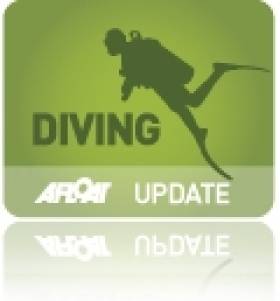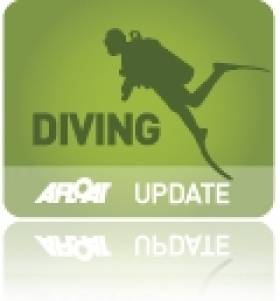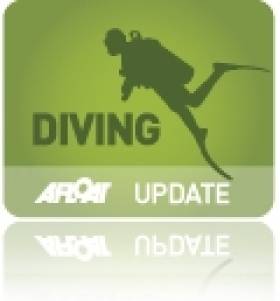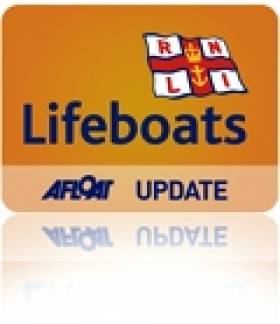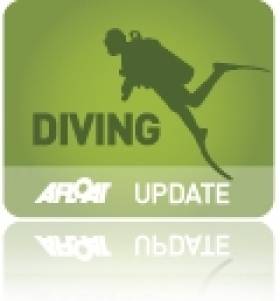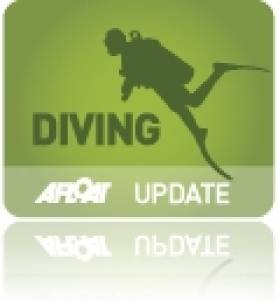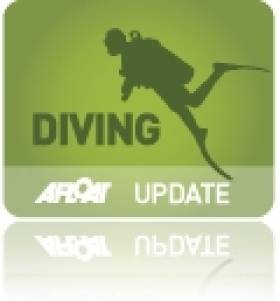Displaying items by tag: Irish Underwater Council
Celebrating Half A Century Of Diving In Ireland
#Diving - The Irish Times' Lorna Siggins profiles the Irish Underwater Council (CFT) as it celebrates its 50th anniversary.
The organisation has certainly come a long way since founder member Michael Moriarty first plunged into the depths with little more than a dry suit and some rubber breathing hoses for air.
Of course technology would revolutionise the pastime, with the development of the diving regulator and later the rebreather system, which made diving much safer and allowed divers to explore beneath the surface better than ever before.
Such developments also provoked big changes in the way Ireland values its national heritage.
Today it's hard to believe that now endangered shellfish were picked on a whim, or that the National Museum considered the numerous wrecks from the Spanish Armada were "not of historical significance".
The Irish Times has much more on the story HERE.
Dive Ireland 2013 Is 'Huge Success'
#Diving - The Irish Underwater Council (CFT) reports the "huge success" of the 22nd annual Dive Ireland expo in Athlone at the weekend.
The two-day event at the Hodson Bay Hotel welcomed "speakers from near and far as well as photography workshops and a fully loaded international trade fair" - not to mention the CFT National Dive Conference and AGM.
Ahead of the expo, Minister for Arts, Heritage and the Gaeltacht Jimmy Deenihan commented on the role of SCUBA clubs and diving centres in Ireland's national tourism infrastructure in promoting this country's dive sites.
In the foreword to the recently published Warships, U-boats and Liners, he also wrote of the Government's commitment to developing its archive of wrecks in Irish waters.
“With the support of responsible dive centres and local dive clubs ... these wrecks can be explored now and into the distant future by visitors from home and abroad.”
According to the CFT, local authorities are also starting to recognise the importance of developing aquatic activities to encourage tourism.
One example is Mayo County Council's Blue Ways list of swimming and snorkelling sites along the county's coast, which complements its Green Ways walking trails.
The council also highlighted the importance of heritage among Ireland's diving community, and their role in discoveries such as the Viking-era swords retrieved from the River Shannon near Banagher last autumn, as the Offaly Independent reports.
Dive Ireland Expo Returns To Athlone For 2013
#Diving - The Dive Ireland expo heads to Athlone in 2013 with a full weekend of speakers, exhibits and workshops for divers and snorkelers of all levels.
This year's hosts at the Athlone Sub Aqua Club have announced details of the 22nd-annual dive show from 2-3 March 2013 at the Hodson Bay Hotel, which also doubles as the AGM for the Irish Underwater Council (CFT).
Speakers lined up for this year include renowned wreck diver Barry McGill, cave divers Jim Warney and Jason Masterson, limit-pushing free diver Feargus Callaghy and snorkelling advocate Victor Kutischev, as well as representatives from marine wildlife conservation group Sea Shepherd.
Just like last year, Dive Ireland 2013 will also feature a wide array of exhibitors to cater for all types of diver interests - and entry for each day costs just €5.
The Athlone Sub Aqua Club has more details on the Dive Ireland 2013 programme HERE.
St. Patrick's Day Dalkey Island Snorkel Raises Funds for RNLI
#DALKEY ISLAND SNORKEL - More than 100 participants took part in the St. Patrick's Day Dalkey Island snorkel fundraiser event in aid of the RNLI, where the local Dun Laoghaire lifeboat RNLB Anna Livia was hove to off Coliemore Harbour, writes Jehan Ashmore.
Some two hours after high-tide this morning the snorkelers set off from the harbour through Dalkey Sound and made an anti-clockwise circuit of the island.
The circuit took up to an hour to complete and their progress was monitored by a fleet of safety RIBS, with the last participants returning to the harbour around noon.
A crowd gathered overlooking the harbour where fundraising activities took place and it was hoped that the event would raise between €4,000 - €5,000.
The fundraiser was organised by the Marlin Sub Aqua Club on behalf of Comhairle Fó Thuinn (CFT) the Irish Underwater Council. The club was established in 1980 and operates from the Clondalkin Community Sports Centre in west Dublin.
- RNLI
- RNLB Anna Livia
- Dalkey Island
- St Patrick's Day Dalkey Island Snorkel fundraiser
- Coliemore Harbour, Dalkey,Co Dublin
- Dalkey Sound
- RNLI Dun Laoghaire Station
- Marlin Sub Aqua Club
- CFT
- Irish Underwater Council
- St Patrick's Day, Dalkey
- Trent class
- RNLB Ann Livia (1405)
- Comhairle Fo Thuinn
- Dun Laoghaire Lifeboat Station
Dive Ireland Expo Returns
#DIVING - Dive Ireland 2012, Ireland's only dedicated dive expo, promises to be bigger, better and feature more speakers, exhibits and workshops - everything for the dive professional as well as the complete beginner.
The 21st Annual International Dive Show, hosted by the Irish Underwater Council (CFT), will take place at the City North Hotel in Dublin on the weekend of 3-4 March.
This year's show will feature top SCUBA professionals including keynote speaker Rory Golden, who in 2000 became the first Irish diver to visit the wreck site of the Titanic, returning for a second visit in 2005.
Golden will be giving a series of talks on his experiences to mark the centenary of the ill-fated ship's sinking in the north Atlantic.
Dive Ireland 2012 will also feature a huge array of Irish SCUBA companies, free seminars and practical workshops that will cater to a wide range of diver interests, along with a host of in-show features guaranteeing a great day out for divers and non-divers alike.
Visit the Dive Ireland 2012 website for more details on tickets or booking a stand.
Sports Diving Injuries On The Rise
The Irish Underwater Council (ICU) says injuries in sports diving are increasing, the Irish Examiner reports.
Some 12 of a total of 61 registered incidents last year caused injury to divers. Other incidents included near-misses between boats, divers going missing, air shortages and rapid ascent.
ICU national diving officer Martin Kiely said the figures did not necessarily show that more incidents were occurring, but rather that more were being reported.
The Irish Examiner has more on the story HERE.
There Is More To The Water Underneath
My time on the water has been spent 'on the surface,' but those who like to go underwater tell me the attractions of diving are magnificent and that Cork Harbour, my sailing base atop the water, is one of the great 'dive spots' on the Irish coastline.
There are many ways to enjoy the water, so I believe in encouraging everyone who takes parts in watersports. That is one way in which appreciation of the importance of the marine sphere can be advanced.
The Irish Underwater Council, Comhairle Fó Thuinn, known by its initials 'CFT,' promotes diving and is the national governing body for recreational underwater sports in Ireland. Through affiliated clubs, it provides training for diving and snorkelling.

"It's time to dive," the CFT says. "We provide the opportunity for recreation and fun in a friendly environment while maintaining a safe and cautious attitude to Irish waters. The basic objective of the training system is to demonstrate, teach and practice all the necessary abilities until the beginner is comfortable with the equipment and basic safety skills. There is no pressure of time limits and training is at the individual's own pace."
The CFT was founded in 1963 when underwater enthusiasts wanted to establish a national group which would organise and promote sport scuba diving and snorkelling. At that time there were six clubs around the country. The number has now expanded to 84.
I was talking in the past week to just one of those clubs - the Cork Sub Aqua Club which is encouraging more people to take up the sport. It has been in existence for 40 years and organises dives on Wednesday evenings during the Summer and on most Sundays throughout the year. There are visits to dive sites outside of Cork and wreck-diving is organised to suit ability and experience. Divers come from all ages and backgrounds, so there is a great opportunity if for anyone interested to get involved.
"We will begin training new recruits in January, so anyone who joins will be ready for open water by the Spring. No experience is necessary," the club says. "Our qualified instructors are waiting for newcomers and, for anyone already qualified, we say join and dive with us."
The photograph on this week's blog shows two divers enjoying their time in the water, even in this cold period of the year. Niall O'Regan from Monkstown in Cork and Ian Kelleher were diving off Roche's Point. They had a look at a trawler which sank in the area back in the mid-80s. The attraction of diving for them is "the great diversity of sea life to be found around the harbour and the quiet and tranquillity underwater in comparison to the hustle and bustle on land." That is a well-expressed sentiment which I like and encourages me to tell you that I am continuing with attempt to develop my idea for the establishment of an Irish maritime foundation. My thanks to those readers of this blog who Emailed me about it. Some good ideas have been put forward and more are always welcome.
For anyone interested you can get more information about the Irish Underwater Council by Emailing: [email protected] or about membership by Email to: [email protected]
You can Email me in response to items on this blog at: [email protected]
This article is reprinted by permission of the EVENING ECHO newspaper, Cork, where Tom MacSweeney writes maritime columns twice weekly. Evening Echo website: www.eecho.ie
The Allure of the Deep, Is Diving for You?
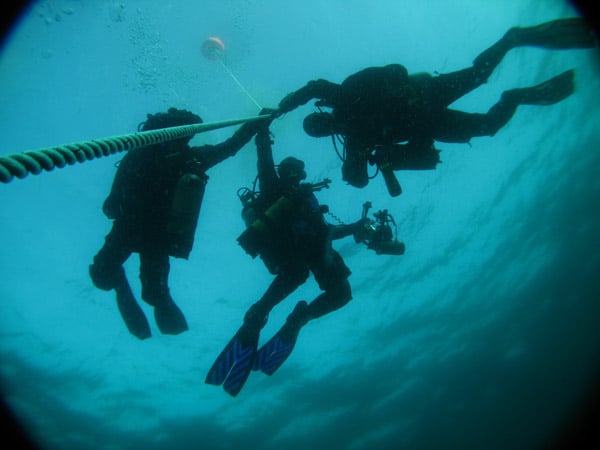
Divers completing a decompression stop after a 40 meter dive to the wreck of the ssFoilia off the Waterford Coast



























